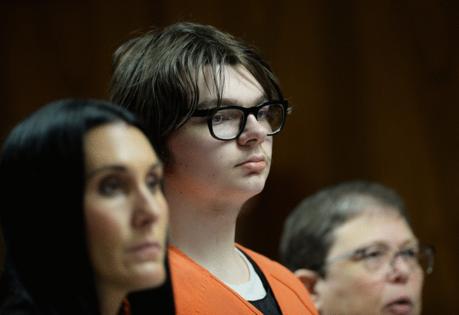Prosecutors: Oxford shooter shouldn't be able to withdraw guilty plea, be resentenced
Published in News & Features
DETROIT — Oakland County prosecutors are rejecting arguments made by appellate attorneys for the Oxford High School shooter to withdraw his guilty plea and have him resentenced, calling them "meritless" and "hollow."
Ethan Crumbley's appellate attorneys filed two motions in June, one asking Oakland County Circuit Court Judge Kwame Rowe to allow Crumbley to withdraw his guilty plea and one to correct what they called an invalid sentence. They said Crumbley's earlier attorneys were not effective in investigating his "cognitive-adaptive deficits" and other mitigating factors in his case.
Crumbley, who was 15 at the time of the 2021 shooting at Oxford High School, pleaded guilty in October 2022 to killing four classmates: Tate Myre, 16; Madisyn Baldwin, 17; Hana St. Juliana, 14; and Justin Shilling, 17. He also pleaded guilty to injuring six other students and a teacher. He's currently serving a life sentence without the chance of parole.
Oakland prosecutors said it is speculation that his attorney when he pleaded guilty was ineffective. While State Appellate Defender Office Attorney Jacqueline Ouvry faulted the shooter's trial attorney for not finding an expert to diagnose him with fetal alcohol spectrum disorder, prosecutors said no experts have diagnosed him with that yet.
Prosecutors said Dr. Lisa Anacker evaluated Crumbley and determined he did not have fetal alcohol syndrome, as she testified at the shooter's hearing to determine if there was enough evidence to give a minor a life without parole sentence.
"The crux of the defendant's argument is built upon speculation that he may have a fetal alcohol spectrum disorder (FASD), yet defendant has never even been diagnosed with such," wrote Assistant Prosecutor Joseph Shada. "This type of speculation is insufficient to sustain a claim of ineffective assistance of counsel — especially where, such as here, the existing record contains an expert opinion that the defendant does not meet the criteria for a FASD."
Even if Crumbley was diagnosed with fetal alcohol spectrum disorder, it would not make a difference in Crumbley's sentence, Shada wrote.
"The evidence presented at the Miller hearing demonstrated that the offenses were not one of impulse or mental disability but rather one that was thoroughly planned by defendant; carried out in a cold, calculated manner; and intended to have a devastating effect on as many people as he possibly could," Shada wrote.
In her own motions filed earlier this year, Ouvry, Crumbley's appellate attorney, said the shooter's cognitive-adaptive dysfunctions — possibly caused by alcohol exposure in the womb — were never adequately raised during his plea and sentencing.
“Ethan was 16 years old, laboring with cognitive-adaptive dysfunction, and suffering from mental illness when he was tasked with evaluating whether to waive his trial rights and enter a plea,” Ouvry wrote in the motion to withdraw a plea.
The State Appellate Defender Office also said that its lawyers found new evidence that doesn’t support a life without parole sentence, including witnesses who can speak to his struggles during childhood, his mother’s alcohol abuse during pregnancy and the potential impact of Fetal Alcohol Spectrum Disorder on his life.
But Shada wrote that speculation isn't enough to demonstrate prejudice, as Crumbley's appellate attorneys have only speculated that an independent expert could have provided favorable testimony.
Even if the shooter's attorneys had provided some of the new evidence appellate attorneys say they had, "it would not have made a difference in the proportionality of his sentence or the outcome of sentencing."
"The hollow claims are insufficient to meet his heavy burden in establishing a factual predicate, deficient performance, and prejudice," Shada wrote. "In the range of defenses to pick from — including the one defendant attempts to assert now postjudgement — none of them escape the fact that this offender and his offenses are deserving of a life sentence."
If Rowe grants the shooter's motion to withdraw his guilty plea, the case will go back to where it stood in October 2022 before he pleaded guilty. The case will then continue with either a jury trial, bench trial or plea negotiations.
If Rowe grants the motion to correct an invalid sentence, he would then hold another Miller hearing and sentencing hearing where appellate attorneys can present new information they obtained in their investigation.
Rowe also can deny both motions.
_____
©2024 The Detroit News. Visit detroitnews.com. Distributed by Tribune Content Agency, LLC.







Comments